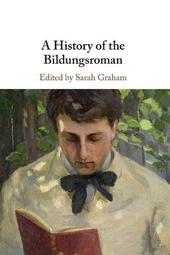
|
A History of the Bildungsroman
Paperback / softback
Main Details
| Title |
A History of the Bildungsroman
|
| Authors and Contributors |
Edited by Sarah Graham
|
| Physical Properties |
| Format:Paperback / softback | | Pages:362 | | Dimensions(mm): Height 229,Width 152 |
|
| Category/Genre | Literary studies - general
Literary studies - fiction, novelists and prose writers |
|---|
| ISBN/Barcode |
9781316501870
|
| Classifications | Dewey:809.39354 |
|---|
| Audience | | Professional & Vocational | |
|---|
|
Publishing Details |
| Publisher |
Cambridge University Press
|
| Imprint |
Cambridge University Press
|
| Publication Date |
18 March 2021 |
| Publication Country |
United Kingdom
|
Description
The Bildungsroman has been one of the most significant genres in Western literature since the eighteenth century. This volume, comprised of eleven chapters by leading experts in the field, offers original insights into how the novel of formation developed a strong tradition in Germany, France, Britain, Russia, and the USA. In demonstrating how the genre has been adopted and adapted in innovative forms of fiction, this volume also shows how a genre traditionally associated with the young white man has been used to give expression to the formative experiences of women, LGBTQ people, and post-colonial populations. Exploring the genre's emergence and evolution in numerous countries and across more than two hundred years, this volume provides unprecedented historical and geographical coverage and demonstrates that the Bildungsroman has a rich heritage and a bright future.
Author Biography
Sarah Graham is Lecturer in American Literature at the University of Leicester.
Reviews'... this stimulating collection is well suited for those familiar with the key scholarship ... Highly Recommended' M. E. Burstein, Choice '... an important contribution to modern scholarship on the Bildungsroman. While it will introduce students to the conventional scholarly debates about the Bildungsroman's historical development and its important variants, it will likely do more to expand our sense of the genre's temporal origins, national boundaries, and types of protagonists. The work might even convince its readers that the Bildungsroman is not merely a hegemonic institution increasingly out of step with modernity. Rather, Graham wants to show us that it is also a category of fiction with subversive critiques of sexism, racism, imperialism, and homophobia at its core, and thus still relevant to and alive in our developing century.' Jordan Bunzel, EUP Journal
|